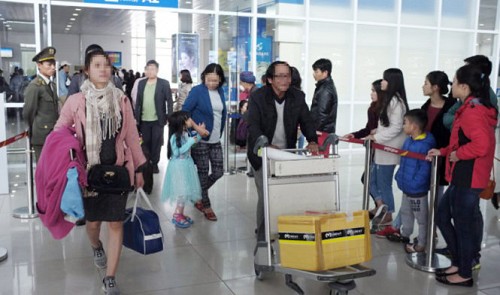Vietnamese airlines did not see eye to eye with one another when responding to a Ministry of Transport's plan to cap airfares for domestic services.
The transport ministry, through the Civil Aviation Authority of Vietnam, is soliciting feedback on a plan to lift the ceiling prices for domestic routes by 7-16 percent to deal with the rising jet fuel costs.
According to the proposed pricing scheme, the maximum price for the Hanoi-Ho Chi Minh City route will be VND3.65 million (US$163) instead of the current VND3.2 million ($143).
Flag carrier Vietnam Airlines and two budget airlines, Vietjet and Jetstar Pacific Airlines, have all provided feedback to the plan, with one suggesting scrapping the ceiling price, whereas the other two said a floor rate for airfares should also be stipulated to ensure fair competition.
Ceiling vs. floor rates
Low-cost carrier Vietjet said the ceiling rate for airfare should be removed as it is no longer necessary and appropriate for the current rapid growing and highly competitive aviation market in Vietnam.
“The government should only manage and oversee the service quality of airlines, rather than capping their domestic airfares,” Vietjet said in a statement.
“The state should respect the healthy competition principles as per the market-based mechanism all airlines are following.”
According to Vietjet, once the ceiling airfare is scrapped, carriers will be able to upgrade and improve their service quality to better serve passengers.
In the meantime, Jetstar Pacific Airlines supported the idea of raising the ceiling price and at the same time suggested that a floor price for domestic airfares should also be put in place to “stop carriers from competing by cheap tickets.”
Jetstar said local carriers have had to repeatedly cut airfares to stay competitive in the last few years, and at some points “offered tickets that were even lower than their cost prices and cheaper than tickets of trains or passenger buses.”
The carrier underlined that this has put pressure on the aviation infrastructure and “affected the business effectiveness and sustainable development of airlines.”
The floor price should be 29-34 percent of the ceiling price, Jetstar suggested.
If the floor price is applied, the minimum ticket for the Hanoi – Ho Chi Minh City service will be around VND1.5 million ($67) per turn for Vietnam Airlines passengers, and VND1.1 million ($49) for those flying with Jestar, according to Vietnamnet.
The Hanoi-based newswire said Vietjet only supported raising or scrapping the airfare cap and strongly opposed to the floor price idea.
The no-frills carrier said applying a floor price for air tickets goes against both the Vietnamese law on competition and international practice, as no country is currently imposing such a price control, according to Vietnamnet.
Vietjet said some 90 percent of Vietnamese population have yet to fly, mostly because they cannot afford a ticket. The floor price for airfares, once imposed, will prevent the chance to access air travel for these people even harder.
Do what’s good for flyers
While the airlines have opposite opinions on the floor and ceiling for airfares, most experts interviewed by Tuoi Tre (Youth) newspaper said scrapping the cap and imposing the floor rates are both unnecessary.
Nguyen Tien Thoa, general secretary of the Vietnam Valuation Association, said local airlines are in fact selling tickets at only 85 percent of the allowed rates, so it is not necessary to remove the price cap.
“When there is no price cap, airlines can freely increase airfares, causing disadvantages for consumers,” Thoa said.
Ngo Tri Long, a pricing expert, also said flyers will suffer the biggest toll should the ceiling airfares are removed.
“The airline with the biggest market share may hike its airfares, and other carriers have no choice but to follow suit, and ultimately it is passengers who have to pay more,” he elaborated.
Thoa added that without the price floor airlines have to try to cut costs to be able to offer more affordable airfares, which is good for passengers.
“If a minimum airfare is stipulated, carriers will lose the motivation to compete and cut costs,” he said.
Thoa turned down concerns that the lack of an airfare price floor will lead to unhealthy competition, where as an airline may sell below cost price to manipulate the market.
“Don’t forget that we have the law on competition to oversee the market,” he said.
“You may cut your airfares but if you violate the law, you will be immediately sanctioned.”






















































